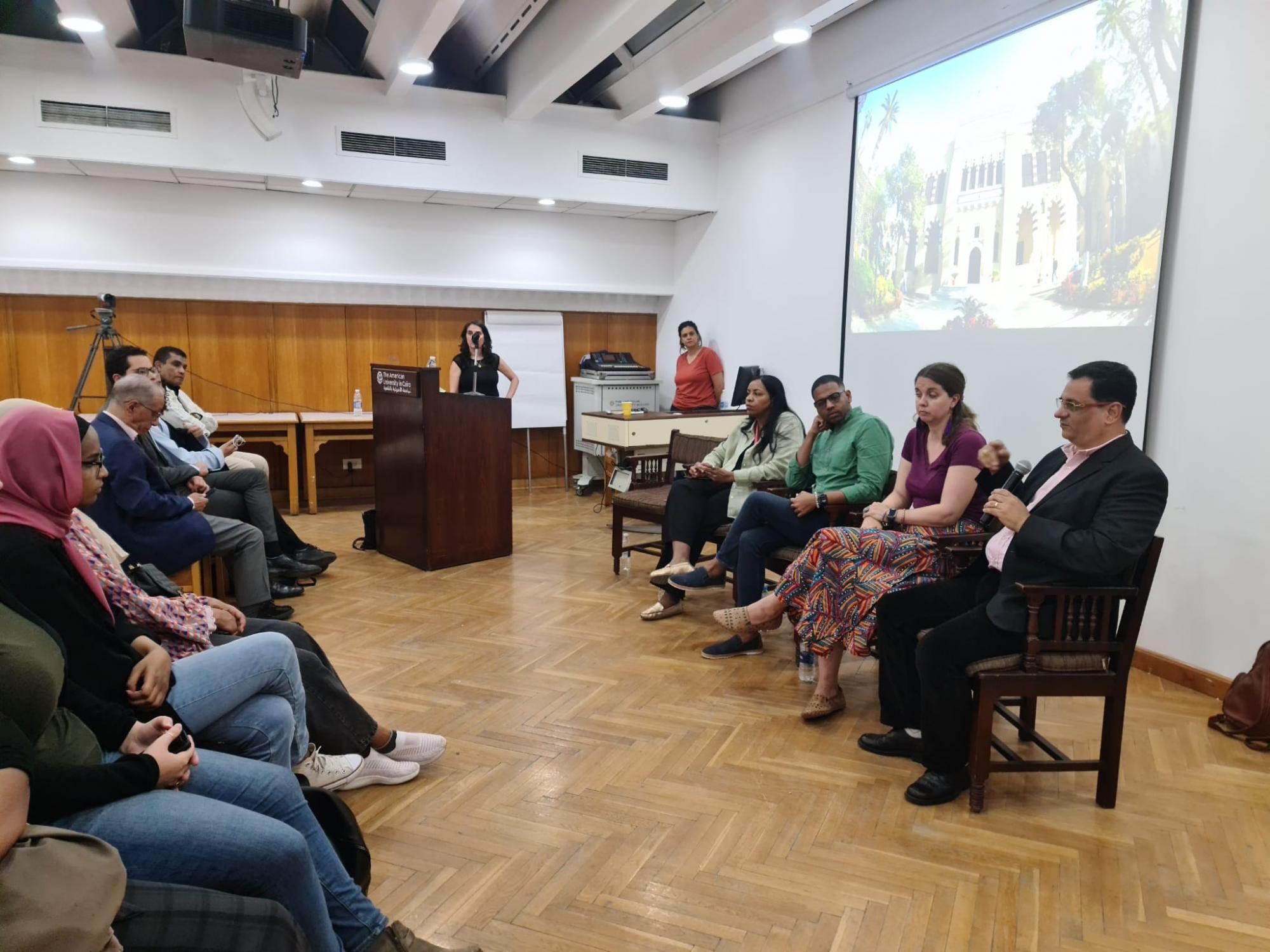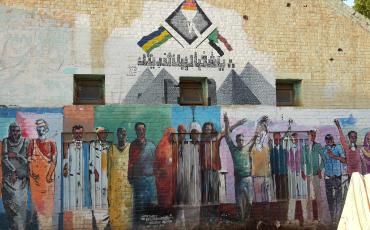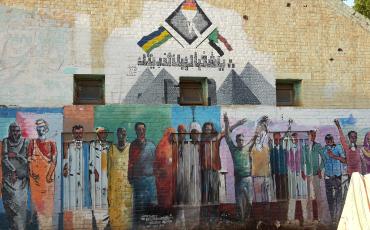On April 15th, following the sudden outbreak of fighting in Sudan, social media was abuzz with calls from families. Many fled in a hurry, some of them reaching Egypt. A Cairo-based initiative reports on their attempt to help out.
Khartoum, the triangular capital of Sudan along with Omdurman and Bahri, has become a deadly battle zone. Among the areas affected are highly strategic sites such as Khartoum International Airport which now lies in ruins, the Presidential Palace, the Military Headquarters, the National Radio and TV, and the most prestigious universities.
For the first time in the history of post-independence Sudan, Khartoum has been the area most affected by the non-stop fighting, a deadly shortage of basic human necessities, looting, rape, and the destruction of hospitals.
Since April 15th 2023, more than two million people have been forced to leave their homes and associated memories to seek refuge with their relatives and extended families across Sudan. Khartoum accounted for the highest proportion (69 percent) of internally displaced persons. The majority is seeking refuge in other regions of Sudan, while, simultaneously, a few hundreds of thousands are crossing the borders into neighbouring countries, mainly Egypt, Chad, and South Sudan.
The situation at the border
Heading up along the north-flowing streams of the River Nile from Sudan to Egypt, many had intended to reach the border in order to process their travel documents and obtain their visas to enter Egypt. In the early weeks of the war, visas were only required for men between 16 and 50 years of age; everyone else was exempted based on the Egypt-Sudan bilateral agreement the “Four Freedoms Agreement”. In a direct violation of this agreement, Egypt announced that commencing June 10th 2023, all men, women, and children crossing the border or coming in via air would need visas before arrival.
Due to these new regulations, people who have already made dangerous journeys through the country can now expect even longer waiting times and poor conditions at the Sudan-Egypt border. In the visa processing centres in Wadi Halfa and Port Sudan, those waiting have been attacked by Sudanese Security Forces. As an immediate response, the group The Emergency Alliance for Displaced Sudanese in Egypt sent an open letter to the Arab Republic of Egypt, UNHCR Egypt, and the Ministry of Foreign Affairs.
One of the group's foremost priorities is the urgent call for Egypt to waive entry requirements for both Sudanese and non-Sudanese nationals fleeing the conflict in Sudan. Another key request entailed granting entry to individuals possessing temporary travel documents issued by the Sudanese border authorities. Setting up a welcome centre for asylum seekers to provide food, water, shelter, toilets, and access to emergency healthcare was also requested.
Even prior to the implementation of this stricter policy, visa applications were subjected to significant delays. This has been causing rifts in many families who had to leave their male relatives behind. Yet, so far, Egypt is the country which has taken on the most Sudanese refugees, particularly women and children. To date, this number has surpassed 215,000 individuals, despite the increasing bus fees, distress caused by the long and exhausting journey, and the challenging conditions on the two sides of the borders.
Struggles in Accessing Essential Services
The echoes of the war resound in Egypt, not only among the newly arrived, but also among many Sudanese who had lived in Egypt before the conflict, and also for those who found themselves trapped and unable to return. For example, a father who came to Egypt seeking medical treatment for his son was forced to stay, struggling to survive and pay rent. Similarly, a recently arrived woman, living with her elderly father and baby girl, was evicted due to her inability to afford the rent.
The newly arriving Sudanese are put in a difficult position as they seek refuge in neighbouring countries that are hesitant to take them on. Those hoping to gain refugee status must face long waiting times for an interview with the United Nations High Commissioner for Refugees (UNHCR). While Egypt has signed both the 1951 UN Refugee Convention and the 1969 Organization for African Unity (OAU) Refugee Convention, research has shown that UNHCR Egypt mainly applies the more restrictive 1951 definition. Conflict is not explicitly recognised as a valid reason to be granted a refugee status, which is why the OAU Convention was specifically crafted to encompass the various factors driving people to seek refuge on the African continent.
Regardless of the legal processes ahead, it is access to education, healthcare, and housing that will be crucial for those who are newly arriving. The disparity between Sudanese rights on paper and practice is striking.
Sudanese and Egyptian nationals have equal access to the public school system. While some Sudanese families do indeed utilise this access, research has found that many do not for a variety of reasons. Among these are bullying, xenophobia, and overcrowding in the school system. A second issue is access to healthcare. On paper, Egypt has one of the most progressive laws in the region when it comes to healthcare for refugees, stating that their access to public healthcare is on par with that of Egyptian nationals. However, issues often arise between the law and its practical implementation. The Egyptian public healthcare system has issues with overcrowding, hygiene, and lacks doctors and nurses. In addition, not all necessary medicine is accessible or affordable, and individuals requiring specialised care such as kidney dialysis must pay out of pocket. Private healthcare is out of reach for many.
The most challenging aspect is the issue of housing. Unfortunately, many newly arriving migrants are exploited, particularly by landlords who overcharge on rent and refuse to provide rental contracts. Moreover, a considerable number of migrants and refugees live in informal areas as they are cheaper. Often this results in little access to schools and health facilities, as well as bullying, harassment, and assault, especially of young single women and unaccompanied and separated children.
How people are trying to help on a grassroots level
Significant initiatives and organised groups have emerged to provide support for Sudanese refugees in Cairo and also across Egypt more generally. Community-based organizations (CBOs) know their communities’ needs best, but they, too, are overburdened. A great number of CBOs are not registered, meaning that in Egypt they cannot accept donations via a bank account. Even those that do have bank accounts can only accept money from within Egypt and not from overseas. Yet money is not the only issue. The war in Sudan is directly affecting the staff who have family in Khartoum themselves. In order to genuinely support refugee-led initiatives, it is critical to go beyond financial contributions and consider holistic support to these CBOs.
Our personal attempt to do so began with the initiative led by Amira Ahmed, a migration scholar based in Cairo. We initially set up a WhatsApp group in order to share information on the available services for Sudanese who had been forced to flee to Egypt overnight, as well as for those still stuck at the borders. We launched a Gofundme campaign, which raised 5,000 USD, to fund much-needed medical supplies and school materials, and to provide shelter for incoming families with children.

Our secondary objective is to raise awareness. In collaboration with the Center for Migration and Refugee Studies and the Department of Sociology, Egyptology, and Anthropology at the American University in Cairo, we organised a public event on Sudan’s conflict and its humanitarian ramifications.
In the upcoming weeks and months, we will continue to host legal information sessions for newly arrived Sudanese, and also organise solidarity concerts, cultural gatherings and informative events in order to welcome Sudanese in Cairo.
What else can be done?
In addition to private initiatives, there has been respectable support both from companies and government bodies in Egypt. The network providers Orange, Etisalat, WE, and Vodafone Egypt have eliminated international roaming charges between Egypt and Sudan for easier, cheaper, and more immediate communication. The Sudanese initiative For Our Sudan has been supported by the Egyptian youth, and aims to provide services to recently arrived Sudanese individuals in Cairo, Aswan, and other cities in Upper Egypt. Professor Ibrahim Awad, Director of the Center for Migration and Refugee Studies, published an opinion piece in one of Egypt’s most widely read newspapers, Al-Shorouk. He urged the Egyptian government to adopt proactive measures in welcoming Sudanese refugees.
The Ministry of Health and Population has indeed offers to meet the medical requirements of both Sudanese and non-Sudanese asylum seekers in all hospitals situated near the border in Aswan and other neighbouring cities. Yet people still continue to arrive in Egypt on a daily basis. We therefore strongly appeal for increased support and the cultivation of a culture that embraces newcomers with open arms.




















